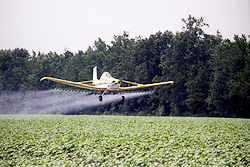 Carnegie Mellon University researcher Christopher Weber found that food transport accounts for only 11 percent of food-associated greenhouse gas emissions, while production contributes a whopping 83 percent. Specifically, nitrous oxide and methane -- mainly byproducts of fertilizer use, manure management and animal digestion -- make up a far bigger piece of the emissions pie than emissions from transporting our food from faraway places, the study found.
Carnegie Mellon University researcher Christopher Weber found that food transport accounts for only 11 percent of food-associated greenhouse gas emissions, while production contributes a whopping 83 percent. Specifically, nitrous oxide and methane -- mainly byproducts of fertilizer use, manure management and animal digestion -- make up a far bigger piece of the emissions pie than emissions from transporting our food from faraway places, the study found.Weber and colleague Scott Matthews conducted a life-cycle assessment of greenhouse gases emitted during all stages of growing and transporting food consumed in the U.S. (using Department of Commerce data) and calculated that the average U.S. household generates 8.1 metric tons (t) of greenhouse gases (in CO2 equivalents) annually as a result of food consumption. By comparison, driving a car that gets 25 miles per gallon of gasoline for 12,000 miles per year (the U.S. average) produces about 4.4 tons of CO2.
Even more surprising, the study noted that U.S. consumers can do more to reduce greenhouse gases by eating one-seventh of a week’s calories from chicken, fish or vegetables instead of red meat or dairy than buying all local foods.:: Via Science News

No comments:
Post a Comment